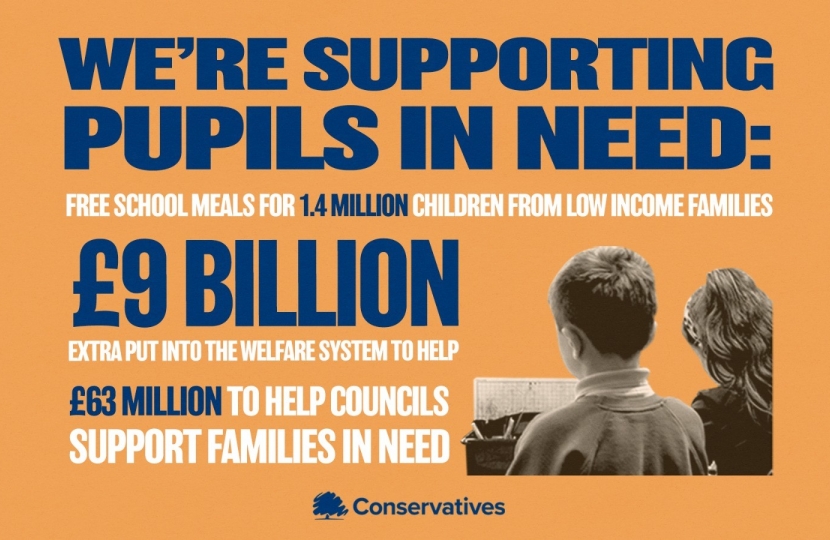
On Wednesday in Parliament, Labour used one of their Opposition Days for a debate on free schools meal. Having listened to the debate, I decided to vote against their motion. Although this motion would not have changed the law or made any practical difference, the underlying principle of this issue is very important and I wanted to explain my decision. This was not a vote to take free school meals from children.
Members on all benches in the House of Commons are committed to tackling child poverty and ensuring that no child goes hungry. A disappointing aspect of the debate were claims that this wasn’t the case.
I am committed to free school meals and this Government has expanded the eligibility to more children by offering a free school meal to every child in reception, year 1 and year 2, to those students from lower income eligible families in further education colleges and, most recently during the pandemic, to children of families on lower incomes with no recourse to public funds.
Free school meals have been given to children on low incomes in schools for over 100 years. They are intended to provide hot healthy meals for children while in school to help pupils learn.
This year, as schools were largely closed, parents had to provide an extra meal five days a week for their children. So the government took the right decision, recognising the incredibly difficult circumstances families faced, to provide free school meals when pupils were learning from home. I worked with local schools to help resolve issues that occurred with the National Voucher Scheme so that parents could access that support. Families received £380 million in vouchers through this scheme.
I supported the campaign at that time to extend support over the summer months as an exceptional measure that reflected the unprecedented situation families faced. This provided a further £120 million of vouchers.
Now schools are open, kitchens are open and children are again receiving free school meals at school, many schools are also providing parcels to those who are self isolating due to COVID-19.
I certainly agree that vulnerable families need additional support and help particularly at this most difficult time. The issue is whether the best way to support low income families is to continue to provide vouchers indefinitely through school holidays; or if instead we should provide targeted support through the welfare system, rather than schools, or schemes such as the local authority welfare assistance programme, outside of term time.
Strengthening the welfare system is in my view the better approach to provide support to those most in need.
I welcome the £9.3 billion the government has provided this financial year, which means an extra £1,040 for families on Universal Credit and Working Tax Credits. This extra £20 a week will continue through half term, Christmas, the spring half term, and the Easter holidays. In addition, Norfolk County Council has been given £1 million to support families with urgent needs as part of £63 million provided to local authorities to help people struggling to afford food or other essentials.
Our objective must be to tackle child poverty and I am committed to helping families in North West Norfolk. The best and most effective way to do that now and over the longer term is through the welfare system, or specific targeted programmes such as the local authority welfare assistance fund. This ensures that support is reliably delivered to those who need it most, when they need it most, and in a way which allows families to spend it in the way which will help them best. The welfare system is set up to provide this direct support all the year round in a way in which schools are not.
I will continue to help families access support that is available and raise any issues with the Department for Work and Pensions.

